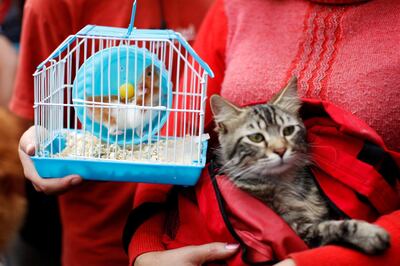Something odd and slightly alarming is happening in many prosperous countries. Couples seem to be choosing to have pets rather than children.
One of the most striking global trends of recent years is that as nations become more prosperous, the birth rate falls. Global fertility rates have halved since the late 1960s, and are now barely above the replacement rate of two children per woman.
Many countries – including the UAE – have now slipped below that level.
But at the same time in many of those countries pet ownership is on the rise. From the US to the Philippines and Europe to the UAE, the number of households owning pets has been creeping up as family sizes decline.
It's not difficult to think up explanations. For one thing parents know that pets are typically far cheaper than offspring. Cynics would add that pets are usually more easily disposed of when they become inconvenient.
But more seriously, the trend is raising concern about the health effects that pets bring, along with the emotional and social benefits.
It’s long been known that pets – especially cats and dogs – can trigger allergic reactions in some people. Close contact with them has also been linked to potentially serious bacterial and parasitic infection, especially in pregnant women, young children and the elderly.
Now researchers are finding evidence of links between pet ownership and more widespread health effects.
One such link has emerged from a study by Swedish scientists into the cause of Type 1 diabetes, the less common form of the disease but which still affects tens of millions globally.
Triggered by the body’s own disease-fighting system, Type 1 diabetes has been blamed on a combination of genetics and environmental factors such as infection by viruses.
________________
Read more from Science:
Long-haul, low-cost: How new technology is changing air travel forever
[ Curl it like Carlos: How to spin the perfect World Cup free kick, according to science ]
[ How climate change could send household bills soaring, with the Middle East at risk ]
________________
As animals are a notorious source of viral disease, a team led by Ashild Olsen Faresjo of Linkoping University, Sweden, decided to find out if pets might be responsible.
The team collected health data from the parents of more than 16,000 children born in the late 1990s, along with details of the pet ownership during pregnancy.
Almost half of the families had pets, with most owning either a cat or a dog. But when the researchers looked for a link with households with children developing Type 1 diabetes, there was little evidence that these were to blame.
By far the strongest evidence pointed to a surprising culprit: hamsters. Owning these rodents was linked to a four-fold increase in risk of Type 1 diabetes.
It’s a connection that is not so outlandish as it seems.
In the late 1990s, scientists identified a new type of virus from a bank vole near the Ljungan river in Sweden. It has been since been found in other hamster-like rodents, and linked to a range of human disorders – including Type 1 diabetes.
Children with the disorder have been found to have antibodies against Ljungan virus – suggesting they have been exposed to it.
Reporting their findings last month in the journal Pediatric Diabetes, the researchers stress that the potential link between the virus and this form of diabetes is far from proven, as it is based on relatively small numbers of cases.

Even so, they admit that their attempts to find alternative explanations came up empty, suggesting the hamster-diabetes link should be pursued further.
If it is confirmed, the real surprise would be that it has taken researchers so long to consider pets as potential sources of widespread diseases.
It has long been recognised that many devastating epidemics began when a virus found its way from animals to humans through close proximity.
The notorious Spanish Flu epidemic of 1918-19 was the result of a virulent form of influenza spreading from farm animals into the general population.
It infected half a billion people, and killed up to 100 million – 1 in 20 of the global population.
Quite what effects pets are having on global health remains unclear – but there are already signs that we could be in for big surprises.
Earlier this summer, a parasite carried by cats was linked to risk-taking in humans.
Known as Toxoplasma gondii, it is also one of the most common parasites in humans, with up to half of the global population having been exposed to it.
While it typically causes mild flu-like symptoms in humans, T gondii has been also been implicated in cases of drug abuse, suicide, neuroticism and even car accidents.
But now researchers have found evidence that the parasite may have potentially beneficial effects in some people.
Studies of rodents have revealed that infection with T gondii can make them more comfortable with taking risks.
This led a team led by Stefanie Johnson at the University of Colorado, Boulder, to wonder whether the parasite might also explain the actions of some human risk-takers – such as business entrepreneurs.
To find out, they carried out saliva tests of moere than 1,500 business students and professionals to look for evidence of a link with the parasite.
The team found that students exposed to T gondii were 1.7 times more likely to be majoring in entrepreneurship-related subjects. Similarly exposed professionals were also 1.8 times more likely to have started their own business compared to those unexposed.
Reporting their findings in Proceedings of the Royal Society Series B, the team stresses it's not possible to prove cause and effect with such studies. However, they add that a similar correlation emerges from global surveys. These show that nations with higher infection rates typically have higher rates of respondents undaunted by a fear of failure in business.
No one is recommending that Elon Musk wannabes get themselves a cat along with an MBA. But both the hamster virus and cat parasite research suggest it is high time scientists found out more about what our furry friends might be giving us along with their affection.
Robert Matthews is visiting professor of science at Aston University, Birmingham, UK






